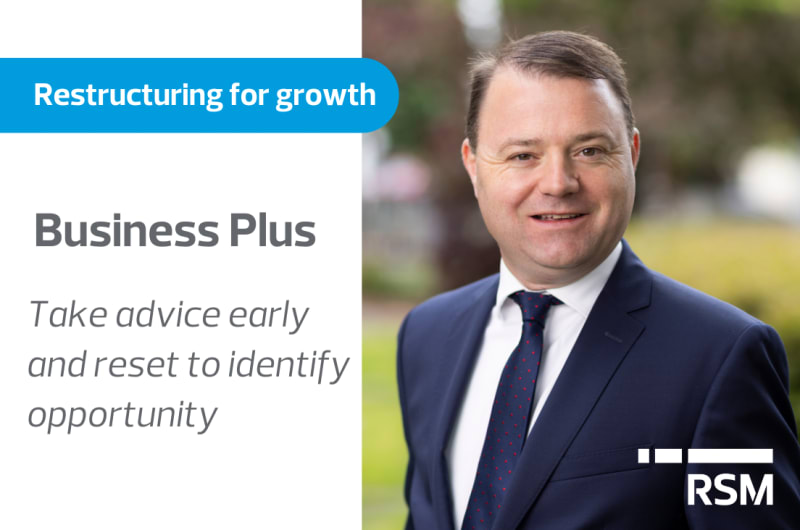To facilitate decision making, RSM Ireland work with business leaders and management to formulate objectives that provide direction and purpose, writes Paddy O'Connell, head of Restructuring Advisory.
REVIEW, RESET, REBUILD
Having survived Covid and following the withdrawal of government support measures, companies must now deal with inflationary cost pressures, rising interest rates, continuing supply chain issues, labour shortages all factors which suggest the Irish economy faces challenges in the medium term.
Many previously robust businesses are struggling to identify solutions to these issues, which is undermining their viability. At RSM we work with our Consulting colleagues from Restructuring Advisory, HR Transformation and Change to Corporate Finance and Technology to assist clients in reviewing, resetting, and rebuilding their business model.
Review
Companies must REVIEW their performance to identify weaknesses in their business model and to set short and medium-term priorities. We work with many businesses reviewing their business models to identify new market opportunities, cost savings and opportunities to improve performance. This exercise should ensure your business is structured for the ‘new’ normal and is not simply based upon an outdated, business model.
Many companies have encountered serious issues with contractual obligations undermining their viability. These issues include significant delays to projects starting and inflationary pressures on fixed-price contracts. If the underlying business remains viable, a reorganisation of the contractual base can address the losses and ongoing costs associated with problem contracts.
Losses associated with the pandemic combined with a variety of geo-political, economic, and strategic issues have adversely impacted the value of many businesses, primarily due to a decline in EBITDA. The associated value of a business can therefore be less than the value of the secured debt, meaning the secured lenders are the effective owners of the business. A reorganisation addressing the levels of debt and operational costs may significantly improve the value of the business.
At first glance, many companies seem financially healthy – trade is picking up and they have cash in the bank. However, many businesses have stretched creditor terms and built-up significant creditor arrears, including rent and Revenue debts. Many cash positions are artificially high, and as trading normalises the unwinding of these arrears coupled with weakening performance will place significant strain on company cash flow. Many businesses are not equipped to prepare accurate forecasts to manage this process and inform their stakeholders.
Reset
To RESET your whole business or a particular division it is important to understand the options available, the associated benefits and the step-plan required to deliver changes, be that streamlining operations, reducing operational costs, exploiting new market, or exiting loss making contracts.
Our approach at RSM includes identifying and evaluating potential strategies and understanding the interaction with the various stakeholders in the business. This includes looking at:
- Management incentives: A company’s value may be significantly affected by issues including the pandemic, a shift in the market, supply chain problems, or inflation. As a result, performance and valuations have been undermined with a critical impact on management incentivisation schemes. Aligning management interests to ensure these key stakeholders are motivated and their interests match those of shareholders is essential.
- Ringfencing liabilities or onerous contracts: Can reduce the associated drag on profitability and cash. This this can be implemented through negotiations or a formal restructuring process and would typically form part of a wider reorganisation to maximise stakeholder value and protect investment. Selling non-core assets: Peripheral and non-core assets can drag on management time and investment. In many cases, overall performance and returns can be improved by exiting these assets through appropriate divestment strategies and supporting processes.
- Funding / financing: A company’s capital/debt structure may be undermined because of underperformance, or a change in the investors’/enders’ strategic direction. As part of a reorganisation, it is worth considering the appropriateness of the funding structure required to support short- and long-term ambitions. Supplier payments to improve working capital efficiencies: Cash is the lifeblood of any company, and there are times when supplier payments must be deferred or compromised to improve a company’s cash flow. This may be done as part of a general working capital reorganisation, including discrete supplier negotiations to alleviate short-term cash pressures.
- Implementation of cost reduction processes: Certain changes can be made swiftly, allowing management to deliver additional value. This requires good relations with a variety of intermediaries – property advisors, operational experts, solicitors, funders – across a wide variety of sectors.
Rebuild
Despite the uncertain economic climate, businesses must continue to develop and REBUILD. This is necessary to incentivise and reassure staff and stakeholders but should also ensure that businesses are well placed to take advantage of improving and evolving economic trends.
To facilitate decision making, RSM work with business leaders and management to formulate objectives that provide direction and purpose. These objectives help both to motivate employees and to set targets that can be used to measure progress. A project plan is required outlining a company’s goals, the specific tasks required to achieve the goals, and making clear what a successful outcome is.
Workforce investment is needed to ensure the correct level of skills are created, and that employees are engaged and retained via appropriate incentives and clear career paths. Professional advice can deliver real value across a variety of areas (including finance, strategy, business modelling, technology) and should be utilised where available. Too often, management teams try to go it alone and that results in otherwise avoidable issues.
Company stakeholders with a vested interest include owners, managers, investors, employees, customers, and suppliers. Their support must be obtained so that a company can return to healthy profit, and this will involve, demonstrating authentic, competent leadership; establishing clear lines of communication; and finding the right balance between the needs and incentives of the various stakeholders.
Leadership means bravely making the changes needed to operate in a vastly changed landscape. However, the decision-making process must be one of calculated risk taking, supported by careful deliberation and preparation which requires appropriate Restructuring professional support.
As published in Business Plus Magazine June/July 2023





